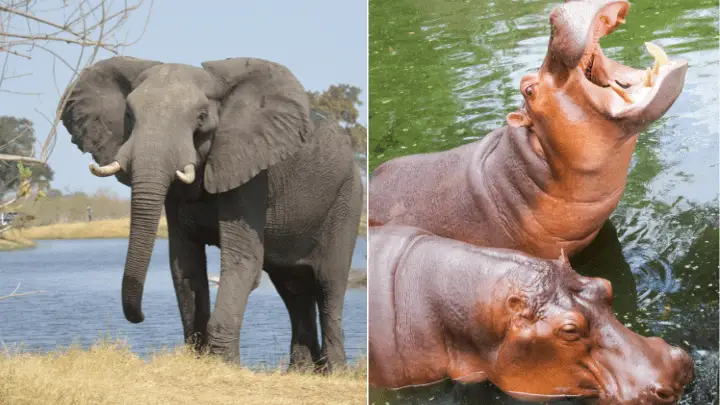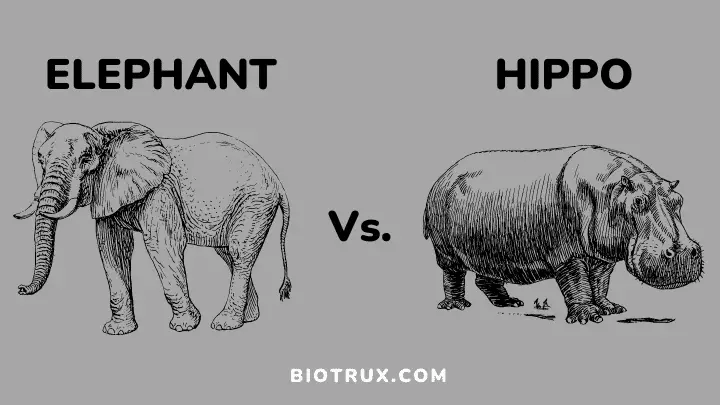If you’ve ever enjoyed watching them in their natural habitats, you know that an elephant and a hippo are two of nature’s most fascinating creatures. These animals are indeed wonders to behold, from their imposing size to their unique movement style.
But how much do we know about each animal? Let’s dive deeper and compare the two on various criteria: body mass, intelligence, diet, range, and more. Read on because it’s time to explore the wild world of elephants and hippos.
A Brief Overview of Elephants and Hippos

Elephants and hippos are both remarkable animals. Elephant species, including African bush and forest elephants, are the largest land animals in the world.
These majestic creatures are intelligent, social, and long-lived, often living into their 70s in the wild.
Hippos, also known as river horses, are semiaquatic animals with thick skin and thick lips for grazing on land and in water. They are agile swimmers with powerful jaws that can open to a width of almost 180 degrees.
These animals face significant threats due to habitat loss, poaching, and other human activities. Conservation efforts have been put in place to protect them, but their future is uncertain. With our help, these fascinating animals hopefully can survive and thrive.
Comparison Between an Elephant and Hippo
The following are the various comparison of an elephant and a Hippo based on several criteria:
1. Physical characteristics
Size and weight comparison
Elephants are much bigger than their hippo counterparts, weighing an estimated six to seven tonnes on average compared to a hippo’s three to four tonnes.
This is even more pronounced when considering that the elephant is still growing, whereas the hippo reaches maturity at around six years old.
On top of this, an elephant stands at an impressive 8 – 13 ft high at the shoulder, while hippos don’t quite reach 4.6 ft.
Adaptations for survival
Hippos and Elephants may appear worlds apart but they share several remarkable survival adaptations. Elephants are highly intelligent and use their tusks to dig for food and water, while hippos rely on powerful jaws and large teeth to tear through vegetation.
Elephants spend much of their day grazing and ruminating on dry land but venture into waterholes periodically to drink and bathe – while hippos reside in large herds in shallow pools, coming onto land only during twilight hours.
Both animals are formidable foes capable of defending themselves or their young against predators, with elephants even helping other members of their herd in times of distress.
These gentle giants have adapted to survive and thrive in the ever-changing wildlife landscape despite being two species.
2. Habitat and Distribution
Elephants and hippos might be herbivores, but their range, habitat selection, and behavioral patterns are surprisingly diverse.
Elephants roam broad swaths of grasslands and forest habitats across Africa and Asia, while hippos are restricted to small pockets along riverbanks and shallow lakes in Sub-Saharan Africa.
Several factors, such as food availability, climate suitability, and competition with other species, determine this difference in range. Furthermore, elephants are also highly mobile, roaming hundreds of miles in search of food or water. In contrast, hippos stay in one place for most of the year.
Ultimately, both species rely on a combination of resources, protection from predators, and suitable temperature to select their habitats – but it’s clear that each has its distinct requirements.
3. Diet and Feeding Habits
Comparison of diet
While both are plant eaters, elephants consume a diverse diet, including grasses, leaves, bark, and fruit. Elephants can eat up to 300 pounds of food per day
On the other hand, hippos specialize in water plants like lilies, papyrus, and reeds; they’ve even been known to eat the occasional carrion (decaying animal flesh). Hippos can eat about 88 pounds of food per night.
So while both animals might have similar dietary habits, their food choices differ.
Feeding behavior
Elephants and hippos may have little in common, but they are surprisingly similar regarding feeding habits. Both animals graze through large amounts of vegetation – for elephants, it’s the grasses of the Savannah, while for hippos, it’s the waters of the riverbank.
Yet both species take a slow, methodical approach to feeding; instead of snatching a quick bite between movements, they spend hours munching away on whatever takes their fancy. Perhaps we can learn something from these gentle giants: savoring the moment is just as important as participating in it.
4. Social Behavior and Communication
Social behavior
Elephants and hippos are large mammals native to the African continent, yet their social behaviors couldn’t be more different. Elephants form tight-knit family units, with adults in the herd protecting and guiding their young.
At the same time, hippos exist as mostly solitary creatures, often engaging in aggressive behavior as they fight for dominance over a particular body of water. However, both species are fiercely protective regarding their offspring – something that all parents can appreciate.
Communication methods
From their immense size to their communication ability, elephants and hippos share some remarkable similarities. While elephants are renowned for their deep, resonant trumpeting that can be heard from miles away, hippos use high-pitched squeaks, hisses, and grunts to communicate.
Even more remarkable is that these sounds are so low that they are heard by other elephants and hippos up to three miles away. But these animals don’t rely on sound to interact—they also engage in fascinating tactile displays like trunk entwining and head rubbing that convey comfort and security.
Mating
Ah, mating… where do I begin? Elephants engage in a ritualistic form of courtship, with males performing complex displays of parenthood and protection to woo the females. Females usually come into heat during the second half of the rainy season, when rutting occurs (or mating).
The mating season is when bull elephants (males) produce large amounts of a hormone called ‘musth,’ which increases their aggression and sexual activity. Elephants last for about one to two minutes while mating.
In most cases, female hippos are submerged in water by male hippos for most of the mating process; their heads pop up occasionally to breathe, and they may choose to mate on land on infrequent occasions.
After mating with the cow, the bull pursues another female to repeat the process because hippos have multiple mates and are polygamous. Mating lasts a half hour and occurs thrice over three days when the female is fertile.
Gestation in Elephants lasts for 24 months, while in hippos, it lasts for eight months. They have one thing in common: they only give birth to one offspring per pregnancy.
5. Threats and Conservation
Threats to both species
Elephants and hippos have much in common – they’re both majestic, enormous creatures from Africa. Unfortunately, both species are under threat from human activities.
While both species face threats from poaching due to the value placed on their tusks/armor plating, they also suffer habitat loss due to land development for human settlement.
Elephants are increasingly hunted for ivory tusks, whereas hippos offer less sought-after resources such as meat and hide. Nonetheless, both animals are integral to maintaining the natural balance within their respective ecosystems, and we must protect them.
Conservation efforts
Both species are threatened by human-driven development, from habitat loss due to agriculture and settlements to poaching for the illegal wildlife trade.
One way humans intervene is through ex-situ conservation of biodiversity – the relocation of animals from their natural habitats to an artificial environment such as a zoo or a sanctuary.
For example, the Tanzanian government has taken steps to protect its population of African elephants by relocating some of them to safe reserves while hippo sanctuaries are in place in Senegal and Zimbabwe.
There is still more work to be done, but with collective effort, we can help ensure these majestic creatures survive.
Elephant Vs. Hippo: Who Would Win in a Fight?
It’s the ultimate clash of titans. On one side is the majestic elephant, armed with a mighty trunk, powerful tusks, and intimidating size. On the other is the hippopotamus – a giant semi-aquatic beast boasting immense strength and razor-sharp teeth. Who will prevail in this epic face-off?
It’s impossible to say, but the elephant would have the edge. With its massive size and incredible strength, an elephant can easily take down any creature that stands in its way.
The hippo’s impressive size and sharp teeth may be intimidating, but they couldn’t compete with an elephant’s power. In addition, elephants have thick skin and long tusks, which could seriously damage their opponents during a fight.
All things considered, it’s safe to say that if these two giants ever clashed, the elephant would come out on top.
FAQs
What is the average lifespan of an elephant vs. a hippo?
Elephants can live up to 70 years in the wild, while a hippo’s life span is usually much shorter, about 36 years.
Are elephants or hippos more dangerous to humans?
The answer may surprise you when deciding which of these giants would be more dangerous to humans. Elephants are peaceful and relaxed until provoked, while hippos can be easily agitated.
Hippos account for nearly twice as many deaths as lions, the world’s second most lethal mammal after humans.
Final Thoughts: Elephant Vs. Hippo
Ultimately, both elephants and hippos have unique characteristics that make them amazing animals in their own right. Both are intelligent, powerful creatures, yet they differ dramatically in their lives and interactions with the world around them.
Elephants can be considered more social and gentle, while hippos prefer to live solitary lives and are known for their aggression. Each species has strengths, abilities, and characteristics that make it a fantastic animal.
So, please take a moment to appreciate these majestic creatures, and remember that they each offer something special to the natural world.
Find more interesting articles on Biotrux.
Thanks for reading.
